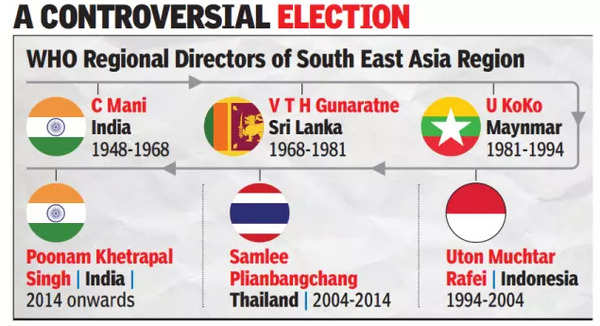World Health Organisation and India/ South Asia
This is a collection of articles archived for the excellence of their content. |
Regional directors from South Asia
1948 – 2022
Rema Nagarajan, Oct 16, 2023: The Times of India

From: Rema Nagarajan, Oct 16, 2023: The Times of India
Over 60 public health and global health practitioners from across the world have written to the WHO seeking greater transparency and oversight in elections to the post of its regional directors. Though there is no reference to the current election to the various regional offices, the letter is against the backdrop of the election to the post of the regional director of South East Asia, which has generated much controversy about Bangladesh nominating the daughter of the current prime minister, Salma Wazed, as one of the candidates.
As the current director of the office of South East Asia Region (SEARO) Dr Poonam Khetrapal Singh's tenure comes to an end, the two contenders for the post are Salma Wazed and Dr Shambhu Prasad Acharya of Nepal. Dr Acharya has been with the WHO for over 30 years and holds a PhD in public health. Wazed has a masters degree in psychology and specializes in autism. The 'Dr' in her title comes from an honorary doctorate awarded by Bangabandhu Sheikh Mujib Medical University in March 2023.
Wazed's nomination has sparked charges of nepotism and raised questions about the way candidates are chosen for the post. Critics have pointed out that she does not have "strong technical and public health background and extensive experience in global health" as required by the official criteria for the role. She has dismissed these charges, stating that she has been an adviser to the director general of the WHO on mental health and autism and a member of the WHO's Expert Advisory Panel on Mental Health for almost a decade. She said, "I cannot help that I am who I am."
The letter from various universities and international health NGOs to the WHO lauded the regional offices for publishing the applications of nominated individuals on their websites but asked for "greater external scrutiny of the Member State nominated individuals". It added that such measures would strengthen "public and professional confidence in the integrity of these processes". "A transparent selection process that rewards those candidates with the best mixture of technical and managerial competence to support countries and the political savvy to ensure that our collective health trumps short-term national interests would help. The current closed process does not serve that end," wrote three public health experts in a letter to the Lancet in May this year. They called for public meetings with shortlisted candidates rather than closed-door discussions open only to member states and sought "systematic independent expert analyses of the capabilities and track records of the candidates”.
The South East Asia regional director is elected through a secret ballot of votes from the health ministers of the 11 member countries: Bangladesh, Bhutan, South Korea, India, Indonesia, Maldives, Myanmar, Nepal, Sri Lanka, Thailand and East Timor. The voting is expected to take place at the WHO's regional meeting at the end of October. This will be Bangladesh's second bid for this post. Bangladesh's adviser to the prime minister on health and family welfare Prof Syed Modasser Ali was its nominee in 2013 against India's Dr Khetrapal Singh. Most regional directors get two consecutive tenures.
Geneva: Bangladeshi activists unite to protest against religious extremism associated with the BNP and Jamaat-e-Islami